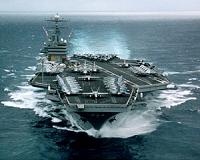| . |  |
. |
Moscow (AFP) Jan 19, 2010 Environmentalists on Tuesday condemned Russian Prime Minister Vladimir Putin for allowing a controversial paper plant on Siberia's pristine Lake Baikal to reopen, calling it a "crime." Putin's decree, signed on January 13 but made public on Monday, reverses an earlier ban on the production of cellulose paper and storage of waste around Lake Baikal, the world's deepest freshwater lake. It is expected to allow operations to restart at the Baikal paper plant, owned by Russian billionaire Oleg Deripaska, which has been closed since October 2008. "This decree is a crime because to protect the interests of one particular oligarch, Putin is casting aside Russia's entire net of ecological laws," Roman Vazhenkov, head of Greenpeace's Lake Baikal campaign, told AFP. "To allow chemical wastes to be dumped there: What else can you call it but a crime?" he added. Lake Baikal, which is on UNESCO's World Heritage list, contains 20 percent of the world's fresh water supply and has been hailed as the "Galapagos of Russia" for its endemic flora and fauna. Generations of environmental activists have fought to shut the Soviet-era paper mill, founded in 1966, which they say endangers Baikal's fragile ecosystem by spewing waste into the lake. But the plant is also an economic boon to the region, and 16,000 employees were cut loose when it was forced to shut in October 2008, driven bankrupt by fines for polluting and difficulties amid the global economic crisis. Activists had worried the aged plant would be reopened in August when Putin, in a surprise stunt, plumbed the lake's depths aboard a mini-submarine and emerged to declare it "ecologically clean." Putin's decree is a "mistake" for economic as well as ecological reasons, said Igor Chestin, head of the World Wildlife Fund (WWF) in Russia. Though long the largest employer in the thickly forested region, the paper mill has now become less crucial and ecotourism has developed as a competing source of jobs, Chestin said. "In the year and three months since the factory closed the situation has changed. People have already begun to find work in other spheres, specifically in tourism and hospitality," Chestin told AFP. "This is a mistake not only because it relaxes the law but because it allows for the comeback of a manufacturer whose importance is waning." Both Chestin and Vazhenov vowed to appeal to UNESCO to add Lake Baikal to its list of World Heritage site in danger. "This not on some secret site but Lake Baikal -- a UNESCO site and a place the whole country should be proud of," Vazhenkov added. "This will be a huge blow to Russia's prestige." The Russian government has taken numerous measures to shore up its struggling Soviet-era industry and halt mass job losses, amid fears that social unrest could spread in economically hard-hit regions. Metals tycoon Deripaska had been Russia's richest man before the financial crisis but saw his fortune decimated by the slowdown. Federal regulators in 2001 required the Baikal paper factory to install a closed-water system to mitigate waste leakage into the lake, but the huge cost of the requirements led to the plant's financial insolvency. Activists said it was unclear whether the new decree would allow the plant to function without the closed-water system.
Share This Article With Planet Earth
Related Links Water News - Science, Technology and Politics
 US navy ship brings water to Haiti
US navy ship brings water to HaitiAboard The Uss Carl Vinson (AFP) Jan 18, 2010 The crew of a US aircraft carrier, which is stationed off the coast of Haiti, is working to supply victims of last week's earthquake with the most coveted resource - fresh drinking water. It is produced on board of the ship, and Rear Admiral Ted Branch, commander of the US aircraft carrier Carl Vinson strike group, says the crew is determined to share this precious resource with suffering Haitians. While technological details of the water production process remain classified, it is based on the energy produced by the carrier's nuclear reactors, according to Captain Bill McKinley, the Carl Vinson reactor officer, who is responsible, among other things for water desalinization. ... read more |
|
| The content herein, unless otherwise known to be public domain, are Copyright 1995-2009 - SpaceDaily. AFP and UPI Wire Stories are copyright Agence France-Presse and United Press International. ESA Portal Reports are copyright European Space Agency. All NASA sourced material is public domain. Additional copyrights may apply in whole or part to other bona fide parties. Advertising does not imply endorsement,agreement or approval of any opinions, statements or information provided by SpaceDaily on any Web page published or hosted by SpaceDaily. Privacy Statement |